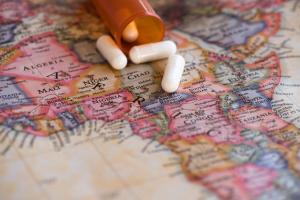In this Issue
- New from CIDRAP-ASP: Antimicrobial resistance (AMR) journalism and our August quiz
- Global news and reports on a public consultation for an action plan on AMR in sexually transmitted infections, an upcoming webinar on tuberculosis drug discovery, the launch of a brief on AMR and primary healthcare, updated guidance for empirical antibiotic use in patients with COVID-19, a new AMR genomic surveillance center, AMR training guidance for community health workers, youth involvement in AMR advocacy, and the founding document for the global AMR evidence panel
- Regional AMR news and projects from the African region, Bhutan, Fiji, India, Malawi, Nigeria, The Gambia, and the United Kingdom
- One Health updates on antimicrobial stewardship in South Asian aquaculture, AMR surveillance in UK dogs and cats, and a tool to measure veterinary drug residues in food
|
|
|
|
|
|
Antibiotic Use in Pregnancy
Take our August quiz to test your knowledge on new research about the safety of certain types of antibiotics used to treat urinary tract infections during the first trimester of pregnancy.
|
|
|
Global AMR News and Tools
 Public consultation on STI action plan. The World Health Organization (WHO) has opened a public consultation on an integrated global action plan for drug resistance in HIV, hepatitis B and C, and sexually transmitted infections, with feedback accepted through Aug 28. Learn more. TB drug discovery webinar. On Sep 9, REVIVE by the Global Antibiotic Research & Development Partnership will host a webinar on "Overcoming challenges of tuberculosis drug discovery and development," featuring presentations from Jeremy Rock, PhD, Dirk Schnappinger, PhD, and Laura Cleghorn, PhD. Valerie Mizrahi, PhD, will moderate the discussion. Learn more. Primary healthcare and AMR. On Sep 9, WHO will introduce a new policy brief on strengthening primary healthcare systems to address AMR. Learn more. Empirical antibiotic guidance for COVID-19. WHO updated its living guidance for COVID-19 clinical management with two new revisions based on a recent meta-analysis: 1) the recommendation of no empirical antibiotics for patients with non-severe COVID-19 and low suspicion for bacterial infection; and 2) the suggestion of no empirical antibiotics for patients with severe COVID-19 and low suspicion for bacterial infection. Learn more. AMR genomic surveillance center. The Pandemic Sciences Institute at the University of Oxford announced the launch of the WHO Collaborating Centre for Genomic Surveillance of AMR. Learn more. Community health worker AMR training. WHO released a technical brief on the inclusion of AMR in training programs for community health workers (CHWs), highlighting AMR prevention tasks that might be expected from CHWs. Learn more. Youth and AMR. The World Economic Forum features a story about how young people, who will bear many of the consequences of healthcare system failures, can continue to advocate for AMR awareness and reduction. Learn more. Founding document for AMR evidence panel. The Quadripartite published the zero draft of the founding document for the Independent Panel on Evidence for Action against AMR. Learn more. |
|
Regional AMR Case Studies
 African region. The International Society for Infectious Diseases, in partnership with Pfizer, announced a request for proposals aimed at strengthening antimicrobial stewardship across the African continent. Proposals are due by Oct 4 at 11:59 pm EDT. Learn more. Bhutan. In The Bhutanese, Chencho Dema reports on the launch of a regional health hub to support research on vaccine-preventable diseases, national immunization efforts, AMR, health economics, climate change, and pandemic preparedness in Bhutan. Learn more. Fiji, India, Malawi, and The Gambia. In an update for the International Vaccine Institute, Elena Krivovyaz, MA, describes the burden of group A Streptococcus, especially in low- and middle-income countries, and the formation of sentinel sites to provide a foundation for Strep A Global Vaccine Consortium clinical trials in Fiji, India, Malawi, and The Gambia. Learn more. India. The Indian Council of Medical Research published the second National Essential Diagnostics List, which offers recommendations on essential tests for a wide range of health facilities and emphasizes the importance of rapid, point-of-care diagnostics. Learn more. Nigeria. On The AMR Narrative blog, Kenneth Chukwuebuka Egwu, BPharm, writes about the prevalent use of over-the-counter metronidazole to treat diarrhea in adults and children in Nigeria, recommending that, along with systemic changes to sanitation, people are offered safe alternatives to rehydrating, managing symptoms, and preventing recurrences. Learn more. United Kingdom. The UK Health Security Agency announced a project to explore the impact of the COVID-19 pandemic on trends in drug-resistant Escherichia coli bloodstream infections across the South West of England. Learn more. |
|
AMR, Agriculture, and the Environment
 AMR surveillance in UK dogs and cats. The UK Veterinary Medicines Directorate has launched a 4-year surveillance study of AMR in healthy dogs and cats. Learn more. Antimicrobial stewardship in South Asian aquaculture. WorldFish announced that it has joined the AMR and One Health–South Asia consortium to support antimicrobial use and AMR reductions in aquaculture in Bangladesh, Nepal, Pakistan, and Sri Lanka. Learn more. Veterinary drug residue tool. The Food and Agriculture Organization of the United Nations published a fact sheet on the Residues of Veterinary Drugs in Foods Tool, which is intended to help countries strengthen their capacity to collect data that may inform AMR management. Learn more. |
|
|
|
|